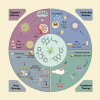Exploiting Nanotechnology for Drug Delivery: Advancing the Anti-Cancer Effects of Autophagy-Modulating Compounds in Traditional Chinese Medicine
- PMID: 38495752
- PMCID: PMC10944250
- DOI: 10.2147/IJN.S455407
Exploiting Nanotechnology for Drug Delivery: Advancing the Anti-Cancer Effects of Autophagy-Modulating Compounds in Traditional Chinese Medicine
Abstract
Background: Cancer continues to be a prominent issue in the field of medicine, as demonstrated by recent studies emphasizing the significant role of autophagy in the development of cancer. Traditional Chinese Medicine (TCM) provides a variety of anti-tumor agents capable of regulating autophagy. However, the clinical application of autophagy-modulating compounds derived from TCM is impeded by their restricted water solubility and bioavailability. To overcome this challenge, the utilization of nanotechnology has been suggested as a potential solution. Nonetheless, the current body of literature on nanoparticles delivering TCM-derived autophagy-modulating anti-tumor compounds for cancer treatment is limited, lacking comprehensive summaries and detailed descriptions.
Methods: Up to November 2023, a comprehensive research study was conducted to gather relevant data using a variety of databases, including PubMed, ScienceDirect, Springer Link, Web of Science, and CNKI. The keywords utilized in this investigation included "autophagy", "nanoparticles", "traditional Chinese medicine" and "anticancer".
Results: This review provides a comprehensive analysis of the potential of nanotechnology in overcoming delivery challenges and enhancing the anti-cancer properties of autophagy-modulating compounds in TCM. The evaluation is based on a synthesis of different classes of autophagy-modulating compounds in TCM, their mechanisms of action in cancer treatment, and their potential benefits as reported in various scholarly sources. The findings indicate that nanotechnology shows potential in enhancing the availability of autophagy-modulating agents in TCM, thereby opening up a plethora of potential therapeutic avenues.
Conclusion: Nanotechnology has the potential to enhance the anti-tumor efficacy of autophagy-modulating compounds in traditional TCM, through regulation of autophagy.
Keywords: anti-cancer; autophagy; nano-delivery; traditional Chinese medicine.
© 2024 Liu et al.
Conflict of interest statement
The authors declare no competing interests in this work.
Figures




Similar articles
-
Autophagy modulators from traditional Chinese medicine: Mechanisms and therapeutic potentials for cancer and neurodegenerative diseases.J Ethnopharmacol. 2016 Dec 24;194:861-876. doi: 10.1016/j.jep.2016.10.069. Epub 2016 Oct 26. J Ethnopharmacol. 2016. PMID: 27793785 Review.
-
The combination of nanotechnology and traditional Chinese medicine (TCM) inspires the modernization of TCM: review on nanotechnology in TCM-based drug delivery systems.Drug Deliv Transl Res. 2022 Jun;12(6):1306-1325. doi: 10.1007/s13346-021-01029-x. Epub 2021 Jul 14. Drug Deliv Transl Res. 2022. PMID: 34260049 Review.
-
Targeting ferroptosis using Chinese herbal compounds to treat respiratory diseases.Phytomedicine. 2024 Jul 25;130:155738. doi: 10.1016/j.phymed.2024.155738. Epub 2024 Jun 1. Phytomedicine. 2024. PMID: 38824825 Review.
-
Traditional Chinese medicine-combination therapies utilizing nanotechnology-based targeted delivery systems: a new strategy for antitumor treatment.Int J Nanomedicine. 2019 Mar 22;14:2029-2053. doi: 10.2147/IJN.S197889. eCollection 2019. Int J Nanomedicine. 2019. PMID: 30962686 Free PMC article. Review.
-
The latest research progress: Active components of Traditional Chinese medicine as promising candidates for ovarian cancer therapy.J Ethnopharmacol. 2025 Jan 30;337(Pt 1):118811. doi: 10.1016/j.jep.2024.118811. Epub 2024 Sep 7. J Ethnopharmacol. 2025. PMID: 39251149 Review.
Cited by
-
Targeted regulation of autophagy using sorafenib-loaded biomineralization nanoenzyme for enhanced photodynamic therapy of hepatoma.Mater Today Bio. 2024 Sep 24;29:101270. doi: 10.1016/j.mtbio.2024.101270. eCollection 2024 Dec. Mater Today Bio. 2024. PMID: 39403315 Free PMC article.
-
Autophagy and Female Fertility: Mechanisms, Clinical Implications, and Emerging Therapies.Cells. 2024 Aug 14;13(16):1354. doi: 10.3390/cells13161354. Cells. 2024. PMID: 39195244 Free PMC article. Review.
References
Publication types
MeSH terms
Substances
Grants and funding
LinkOut - more resources
Full Text Sources

